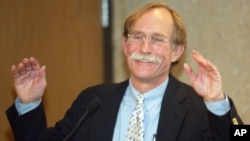A prize-winning American physician will lead a group of Nobel laureates to North Korea next year on a rare mission to engage the communist country through science.
Dr. Peter Agre, director of the Johns Hopkins Malaria Research Institute, said he and four other Nobel laureates would travel to North Korea in May as part of a program through which Nobel Prize winners visit universities in Asia. The program is sponsored by the International Peace Foundation, a private organization in Austria.
Agre said the Democratic People's Republic of Korea should try to produce the country’s first Nobel Prize-winning scientist. Such an effort, he said, would contribute to improved political ties with the international community.
“I am convinced that it will happen, and the efforts that are being made to pursue that could lead to improvements with the DPRK, reduced political tensions, and increased chances of growth, peace,” Agre said in a recent telephone interview with VOA.
Agre recently visited North Korea to tour major universities and institutions, including the Pyongyang University of Science and Technology (PUST), North Korea’s first privately-funded university. The school was founded by Dr. Kim Chin-Kyung, a Korean-American entrepreneur who raised funds mostly from American and South Korean Christian charities.
The American scientist said the university could serve as an important medium through which Washington and Pyongyang engage, given political relations between the two sides.
“This is a unique campus. I know of nothing else like it in the world. The work at PUST may be the major, if not the only, U.S. presence in the country,” Agre said.
But some human rights organizations have raised concerns about such exchanges, saying they could send a signal that human rights violations by the government can be tolerated.
Agre argued that his activities in North Korea had nothing to do with politics.
“We did nothing political," he said. "We are not there to validate the regime and the DPRK. We did not meet government leaders. We did not meet Mr. Kim Jong Un,” he said, referring to the country's supreme leader.
Agre said the government’s restrictions on the use of the Internet were an obstacle to efforts to improve science education in North Korea, but he said the situation appeared to be improving.
Agre, who shared the 2003 Nobel Prize in chemistry, has visited North Korea three times since 2009.
Jee Abbey Lee contributed to this report, which was produced in collaboration with the VOA Korean service.




